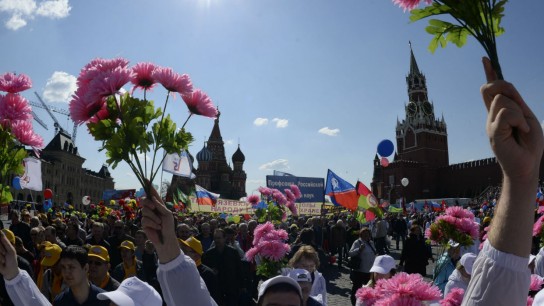Russia spends £1m to keep the rain away
Kremlin forks out for 'cloud seeding' programme in bid for sunny May Day parade

A free daily email with the biggest news stories of the day – and the best features from TheWeek.com
You are now subscribed
Your newsletter sign-up was successful
The Russian government spent nearly £1m over the weekend in a bid to prevent rain on the May Day holiday.
According to the country's official news agency, Tass, the Kremlin paid 86m roubles (£900,000) for a programme of "cloud seeding" - spraying dispersant chemicals onto clouds so they rain earlier.
The practice was developed in the US in the 1940s and later used by the US during the Vietnam War in an attempt to extend the monsoon season and cripple enemy forces with mud. Soviet planes also seeded clouds after the 1986 Chernobyl nuclear disaster to stop radioactive particles reaching Moscow via clouds.
The Week
Escape your echo chamber. Get the facts behind the news, plus analysis from multiple perspectives.

Sign up for The Week's Free Newsletters
From our morning news briefing to a weekly Good News Newsletter, get the best of The Week delivered directly to your inbox.
From our morning news briefing to a weekly Good News Newsletter, get the best of The Week delivered directly to your inbox.
The Russian authorities are thought to have been using the technique for decades. Last year, it was reported that the Kremlin spent millions of dollars to guarantee sunshine for celebrations to mark the 70th anniversary of the end of the Second World War.
The practice received worldwide attention after it was revealed it had been used extensively by the Chinese government during the 2008 Beijing Olympics. It has even been made available to private individuals, "with companies offering the opportunity to have the weather altered for people's weddings", says The Independent.
Russia's attempts appear to have been effective - the May Day parade took place on Sunday under sunny skies.
A free daily email with the biggest news stories of the day – and the best features from TheWeek.com
-
 El Paso airspace closure tied to FAA-Pentagon standoff
El Paso airspace closure tied to FAA-Pentagon standoffSpeed Read The closure in the Texas border city stemmed from disagreements between the Federal Aviation Administration and Pentagon officials over drone-related tests
-
 Political cartoons for February 12
Political cartoons for February 12Cartoons Thursday's political cartoons include a Pam Bondi performance, Ghislaine Maxwell on tour, and ICE detention facilities
-
 Arcadia: Tom Stoppard’s ‘masterpiece’ makes a ‘triumphant’ return
Arcadia: Tom Stoppard’s ‘masterpiece’ makes a ‘triumphant’ returnThe Week Recommends Carrie Cracknell’s revival at the Old Vic ‘grips like a thriller’
-
 Epstein files topple law CEO, roil UK government
Epstein files topple law CEO, roil UK governmentSpeed Read Peter Mandelson, Britain’s former ambassador to the US, is caught up in the scandal
-
 Iran and US prepare to meet after skirmishes
Iran and US prepare to meet after skirmishesSpeed Read The incident comes amid heightened tensions in the Middle East
-
 Israel retrieves final hostage’s body from Gaza
Israel retrieves final hostage’s body from GazaSpeed Read The 24-year-old police officer was killed during the initial Hamas attack
-
 China’s Xi targets top general in growing purge
China’s Xi targets top general in growing purgeSpeed Read Zhang Youxia is being investigated over ‘grave violations’ of the law
-
 Panama and Canada are negotiating over a crucial copper mine
Panama and Canada are negotiating over a crucial copper mineIn the Spotlight Panama is set to make a final decision on the mine this summer
-
 Why Greenland’s natural resources are nearly impossible to mine
Why Greenland’s natural resources are nearly impossible to mineThe Explainer The country’s natural landscape makes the task extremely difficult
-
 Iran cuts internet as protests escalate
Iran cuts internet as protests escalateSpeed Reada Government buildings across the country have been set on fire
-
 US nabs ‘shadow’ tanker claimed by Russia
US nabs ‘shadow’ tanker claimed by RussiaSpeed Read The ship was one of two vessels seized by the US military